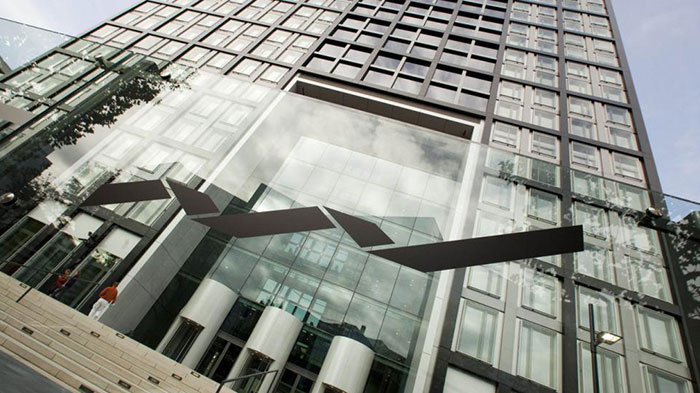US Gets Its Claws into Iranian Assets Again

While US’ $2b theft of Iranian assets has not yet registered, the Americans seek yet another larceny, this time worth more than $6b, demonstrating that the post-deal era has paved the way for pulling down Iran’s assets, hardliner Principlist daily Vatane Emrouz wrote in article, titled “A Post-deal Boxcar” published on Saturday.
On Thursday, Reuters reported that German exchange operator Deutsche Boerse faces a renewed legal battle in the United States over dealings by its Clearstream subsidiary based on its historical relationship with Bank Markazi, Central Bank of Iran.
The plaintiffs are the families of U.S. soldiers who were killed or wounded in the bombing of the Marine barracks in Beirut, Lebanon in 1983. A U.S. court ordered Iran to pay $2.65 billion in compensation to the families, who blamed Iran for the attack.
“Clearstream believes the complaint against it to be without merit. Clearstream will take all necessary and appropriate measures to vigorously defend itself,” Deutsche Boerse said in the statement quoted by Reuters.
The renewed case against Clearstream, Deutsche Boerse post-trade services provider based in both Luxembourg and Germany, is a point of divergence for law experts.
Patrick Rocco, a lawyer for the plaintiffs, said the U.S. Congress made clear when it passed the Terrorism Risk Insurance Act (TRIA) that the law should apply also to assets blocked outside the United States if there was a U.S. connection.
“It was meant to have extraterritorial reach,” Rocco said at a hearing on the case in the New York in September, according to a transcript seen by Reuters on Tuesday.
Apart from the lack of evidence and Iran’s repeated denial of involvement in any act of terrorism, the Congress heresy is even disputed inside the United States. Chief Justice John Roberts, a conservative, has criticized the ruling, saying Congress was “commandeering the courts to make a political judgment look like a judicial one.” Liberal Justice Sonia Sotomayor joined his dissent.
Last year, Reuters said the potential tug of war in the Clearstream case might test the reach of U.S. law in Europe. “This could be a precedent,” said Stephane Ober, who heads the Luxembourg office of law firm Simmons&Simmons.
However, Iran is losing money and has so far failed to find a remedy for the situation. Earlier in April, the US Supreme Court ruled that almost $2 billion of Tehran’s frozen assets must be turned over to American families of people killed in the 1983 bombing of a U.S. Marine Corps barracks in Beirut and other attacks blamed on Iran. The decision sparked a controversy in Iran where the Principlists attacked the Rouhani administration but it backlashed when the latter blamed the Ahmadinejad administration for depositing money within US reach.
In an attempt to prevent recurrence of what is dubbed as “robbery”, Iran delivered on its warning to take legal action against the recent US verdicts affecting Iran’s assets by filing a complaint against the US in The Hague Court known as the International Court of Justice (read more here). The Iranian parliament also passed a plan obligating the administration to seek damages from Washington over its atrocities and crimes against Iran and its nationals in the past 63 years, starting from a coup in 1953.
Now, it appears, none has worked. The US law is at variance with the doctrine and rules of state immunity, says Tehran University Professor of Law, Yousef Mowlaei. “What is under way in the United States is a perilous unorthodoxy which threatens the state immunity principle, which is the main pillar of sovereign equality,” he told Iranian Diplomacy.
Iran still suffers from a well-defined policy on attending US courts. “If it does, it is an implicit acceptation of a law in violation of international law and if it does not, a sentence will be issued in absentia, with no chances of raising a defense,” he said.
However, Mowlaei says Iran can do little against the proceedings as the US judiciary system is acting according to its domestic law. It is only after the final ruling that Iran can litigate on the grounds that the verdict is against the US international commitments. Mowlaei argues that the difficulty for a possible countermeasure on Iran’s part lies mainly in finding an authority with subject-matter jurisdiction. Tehran, he says, has previously invested on the 1955 Treaty of Amity signed between Iran and the United States but it is not clear whether the International Court of Justice recognizes it.
Meanwhile, Iran is left with no other options. The university professor calls it an inadequacy on the part of the international legal system. “It is the balance of power that formulates the legal principles. When the international legal system follows events somehow produced by use of power, you cannot come to grips with a state’s conducts based on predefined regulations. Unfortunately, powerful states have a freer hand to establish new norms or violate previously established ones,” Mowlaei reiterated.
A remedy cannot be worked out for the insufficiency by a single state. “A remedy will be found, only if several states agree to define this as a common problem” he added.
The international law expert says Iran should pursue ways other than legal. “When the root cause is political, Iran must take diplomatic action,” he concludes.

